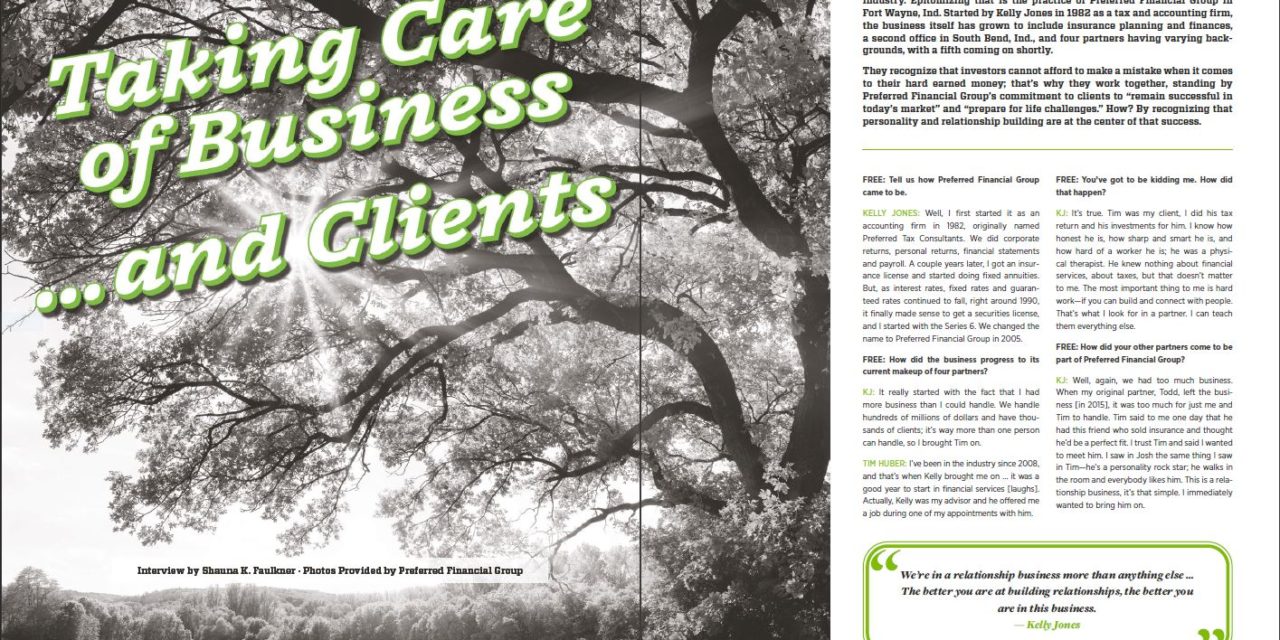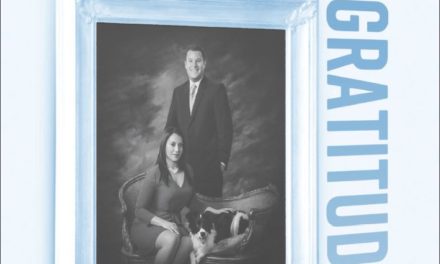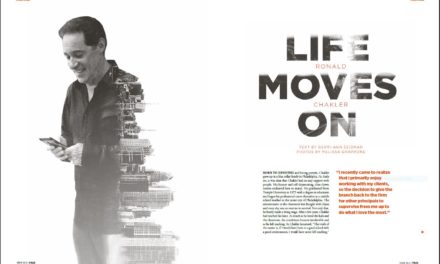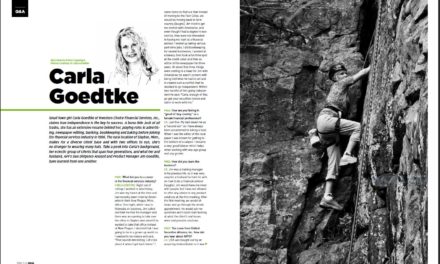
FREE 14.2 – Kelly Jones
We have all come to know that financial services is an ever-evolving industry. Epitomizing that is the practice of Preferred Financial Group in Fort Wayne, Ind. Started by Kelly Jones in 1982 as a tax and accounting firm, the business itself has grown to include insurance planning and finances, a second office in South Bend, Ind., and four partners having varying backgrounds, with a fifth coming on shortly. They recognize that investors cannot afford to make a mistake when it comes to their hard earned money; that’s why they work together, standing by Preferred Financial Group’s commitment to clients to “remain successful in today’s market” and “prepare for life challenges.” How? By recognizing that personality and relationship building are at the center of that success
To view the full article please register below:
FREE 14.2 – Kelly Jones
Taking Care of Business… and Clients
We have all come to know that financial services is an ever-evolving industry. Epitomizing that is the practice of Preferred Financial Group in Fort Wayne, Ind. Started by Kelly Jones in 1982 as a tax and accounting firm, the business itself has grown to include insurance planning and finances, a second office in South Bend, Ind., and four partners having varying backgrounds, with a fifth coming on shortly.
They recognize that investors cannot afford to make a mistake when it comes to their hard earned money; that’s why they work together, standing by Preferred Financial Group’s commitment to clients to “remain successful in today’s market” and “prepare for life challenges.” How? By recognizing that personality and relationship building are at the center of that success.
FREE: Tell us how Preferred Financial Group came to be.
KELLY JONES: Well, I first started it as an accounting firm in 1982, originally named Preferred Tax Consultants. We did corporate returns, personal returns, financial statements and payroll. A couple years later, I got an insurance license and started doing fixed annuities. But, as interest rates, fixed rates and guaranteed rates continued to fall, right around 1990, it finally made sense to get a securities license, and I started with the Series 6. We changed the name to Preferred Financial Group in 2005.
FREE: How did the business progress to its current makeup of four partners?
KJ: It really started with the fact that I had more business than I could handle. We handle hundreds of millions of dollars and have thousands of clients; it’s way more than one person can handle, so I brought Tim on.
TIM HUBER: I’ve been in the industry since 2008, and that’s when Kelly brought me on … it was a good year to start in financial services [laughs]. Actually, Kelly was my advisor and he offered me a job during one of my appointments with him.
FREE: You’ve got to be kidding me. How did that happen?
KJ: It’s true. Tim was my client, I did his tax return and his investments for him. I know how honest he is, how sharp and smart he is, and how hard of a worker he is; he was a physical therapist. He knew nothing about financial services, about taxes, but that doesn’t matter to me. The most important thing to me is hard work—if you can build and connect with people. That’s what I look for in a partner. I can teach them everything else.
FREE: How did your other partners come to be part of Preferred Financial Group?
KJ: Well, again, we had too much business. When my original partner, Todd, left the business [in 2015], it was too much for just me and Tim to handle. Tim said to me one day that he had this friend who sold insurance and thought he’d be a perfect fit. I trust Tim and said I wanted to meet him. I saw in Josh the same thing I saw in Tim—he’s a personality rock star; he walks in the room and everybody likes him. This is a relationship business, it’s that simple. I immediately wanted to bring him on.
JOSH SCOTT: And I’m very glad he did. I started in the sports medicine field and switched to insurance, but this is really how I got started in the financial services industry.
KJ: Chris is a good friend of mine. We started bowling together; like I said, it’s a relationship business. He was in banking, but he’d never done tax returns before. I saw all the good things from Chris that I look for in a partner: somebody who will work well with the others, is good with people and cares about other people.
CHRIS PIERCE: I’m the newest advisor [laughs]. I started working with finances in high school and worked in banks through college.
KJ: I have to have partners that are good at developing relationships because the rest of it’s easy. Mutual funds are mutual funds. If somebody wants to buy some stock, you go and buy the stock. It’s about being able to connect with people more than anything else. You can’t teach people skills.
FREE: Absolutely. That’s a great way to look at it, and certainly helps to differentiate you from others. Any plans to continue growing?
KJ: My son, Ben, is actually studying for the Series 7 right now. He’ll be joining the group before the end of the year, I anticipate. And look, there’s no favoritism here; yes, he’s my son, but he’s not getting anything special. There is no nepotism going on. He’s going to have to pull his own weight just like the rest of us; when I sell this business, I’m selling it to all four of them. They’re all good with that.
JOSH SCOTT: And I’m very glad he did. I started in the sports medicine field and switched to insurance, but this is really how I got started in the financial services industry.
KJ: Chris is a good friend of mine. We started bowling together; like I said, it’s a relationship business. He was in banking, but he’d never done tax returns before. I saw all the good things from Chris that I look for in a partner: somebody who will work well with the others, is good with people and cares about other people.
CHRIS PIERCE: I’m the newest advisor [laughs]. I started working with finances in high school and worked in banks through college.
KJ: I have to have partners that are good at developing relationships because the rest of it’s easy. Mutual funds are mutual funds. If somebody wants to buy some stock, you go and buy the stock. It’s about being able to connect with people more than anything else. You can’t teach people skills.
FREE: That speaks to your succession plan. What do you foresee for transferring the business to your partners?
KJ: I want this business that I started in 1982, and these thousands and thousands of clients that we have, to know that they’re taken care of when I can no longer do it. It’s already gotten to the point that I can’t service them all, which is why we’ve grown. But, we want to retain the business. A lot of my clients are my age. I tell them, “Look, we’re both 64; if we both live to 94, I guarantee I’m not doing your taxes when I’m 94.” [Laughs] It’s really not a question of if you’re going to end up with my partners, but when you’re going to end up with them. So, this succession plan with them growing their businesses inside my business has already started. I’m probably about three years out to retire.
FREE: Sounds like a sustainable plan. How do you all operate as partners?
TH: We kind of work as a team and individually. We all do tax preparation and work with the money, but we all specialize in different areas, too. I do more of the portfolio management side of things here; Josh does a lot in the insurance industry. We work as a team to make sure our clients are taken care of, but all have special niches we’re better at. Kelly, by far, has the greatest knowledge when it comes to taxation; we all go to him for things when we get stuck.
KJ: I guess I’m the chief of chiefs. I’m still teaching them things, but that’s ok. Once I retire, it’ll be them teaching the newer partners. And really, when you’re first starting in this business, it’s about financial security: making money and providing for your family. After so long, however, you don’t even think about the money; it’s all about the clients, but for me, it’s also about helping these guys.
FREE: Considering that, how do you all approach business growth in terms of clients and assets?
JS: We recognize that the importance of downstream clients and that family referrals to family members and children can be significant. We try to retain the business when the generations change, but also approach them as we do all clients. It’s really just treating our current clients the way we would want to be treated: make them feel comfortable and answer any questions they have—even if we don’t know the answer, we make sure to be upfront and tell them that, but assure them we’ll find the answer for them.
CP: That’s really what makes us successful as a group. It’s the service. We answer e-mail, we answer phone calls, even on a Saturday, and are responsive to our clients’ needs.
TH: We want to provide exceptional service for clients. We want them to have an experience they can’t get anywhere else by going above and beyond. We try to treat them like family members. As Kelly has said, it’s about relationships and that’s important to us.
FREE: It seems like the relationships you build with clients is the driving motivator for you all.
KJ: As I’ve said, we’re in a relationship business more than anything else. It’s been my experience over 40 years that, yes, I’m an accountant; yes, I’m a tax preparer; yes, I sell insurance; yes, I’m a financial advisor. But the most important thing is relationships. The better you are at building relationships, the better you are in this business. I know I can get results and do well for the client. But I have to convince them I’m the right guy for the job, that they mean something to me and feel like they are part of a family. If you don’t build the relationship, somebody’s going to steal your client.
JS: Kelly gave me advice when I first came on. He told me, “If you do the right thing for the client, your business will grow.” And we stand by that. If you take care of the client—not try to sell them some expensive, ridiculous annuity just to make a big commission, and really just do the right thing and have their best interest at the forefront—then you’ll see your business grow.
KJ: That’s what I’ve tried to teach each of them. If you do the right thing every single day, you sleep well at night and can be successful at anything. This isn’t just with financial services. Any business can be successful when run the right way and treating people right. It’s not that hard.
FREE: Very true. How did you come to join American Portfolios?
KJ: Ha. Well, this is my fifth broker/dealer. I was with two based out of Michigan and liked those firms, but they sold. I was also with Royal Alliance. Based off my experiences, when my OSJ Tom Perry [Tom Perry Financial Group, Indianapolis, Ind.] and others moved to AP, I told him I would never do business with a New York broker/dealer again. I had no interest. Well, he twisted my arm. This was in 2006, and he had me on a plane to visit. But, what really convinced me? [AP CEO] Lon [T. Dolber] convinced me. Kicking and screaming [laughs], but he did it. I had been sold too many times before, but he convinced me that he would do his best by everyone and would stay out of my way. That’s what I wanted.
FREE: That’s the true meaning of independence, and AP is certainly committed to that. With this issue’s theme of “the new normal,” can you speak to how you feel business may have changed with the disruption of 2020?
TH: Well, working from home was definitely a change, but it went well. Actually, from my standpoint, my clients were very receptive; I was shocked at how many clients in their 60s and 70s opted to do online meetings. I still have clients today asking for online meetings. I think that’s a change that’s going to stick.
KJ: For me, I never worked from home, so I don’t think there’s been much change. People are still people; they want a close relationship with the most important people in their lives. Obviously, meetings are going to be different, I get that. But overall, the way in which we operate our business—focusing on the clients—will never change. Our business still continues to grow through all of this.
FREE: That’s great to hear and is a positive note for the future. Thank you all for taking time to speak with us and share with our readers.












